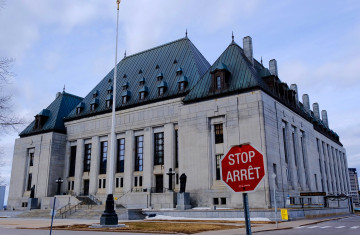The year in Quebec media
The past year brought a number of events that critically affected the media industry in Quebec. Between trials with decisive outcomes, the announcement of government funding for the industry, layoffs and controversial issues, it’s definitely been an eventful year.

It was a huge relief for Marie-Maude Denis, and for all journalists: the Supreme Court ruled the Radio-Canada journalist won’t have to reveal her sources as part of the lawsuit instituted against former Quebec Liberal minister Marc-Yvan Côté.
This decision challenged the Journalistic Sources Protection Act, which was passed unanimously in 2017 by the House of Commons. The country’s highest court maintained that journalists should only be forced to reveal their confidential sources as a last resort and when public interest requires it.
Charged with fraud, breach of trust and conspiracy, Côté claimed that elements of the police investigation that led to his arrest were leaked to Denis, who was working at Radio-Canada’s investigative journalism program Enquête, thus compromising his right to a fair trial. He demanded that Denis reveal the identity of her sources to prove his allegations and have the charges against him dropped.
However, the Supreme Court referred the case back to the lower court in light of new evidence.
Former Liberal deputy premier Nathalie Normandeau was co-accused in this case, in which the Quebec Superior Court ordered a publication ban from November 7 to December 2 to prevent further leaks.

The Supreme Court of Canada ruled in favour of journalists’ right to protect their sources.
The founders of the Journal de Mourréal, a site publishing fake satirical news, lost their case against the “real” Journal de Montréal, which took legal action to put an end to the parodic trademark. After a trial that lasted a few days, judge Micheline Perreault ordered Janick Murray-Hall, the creator of the Journal de Mourréal, to change the name of his digital platform and pay $23,500 in damages to Média QMI.
After renaming his site Le Journal de Marrrrde, Murray-Hall chose to appeal the judgment, invoking the parody exception.
On the other hand, Richard Martineau’s $350,000 lawsuit against independent publisher Ricochet was resolved amicably, at one minute to midnight on the eve of the hearing. The source of the dispute was a 2016 column by Marc-André Cyr which was a mock obituary of the Journal de Montréal columnist. The column was accompanied by a cartoon of a dog urinating on his tombstone.
Martineau claimed that the limits of freedom of expression had been exceeded, and that the text was an incitement to hatred. For its part, Ricochet argued that Martineau knew full well that the media outlet didn’t have the means to fight a legal battle of this magnitude and labelled the action a gagging lawsuit.
The digital platform, which relies on freelancers, started a crowdfunding campaign to prepare its defence. When the settlement was announced, journalist and Ricochet cofounder Gabrielle Brassard-Lecours stated that the media outlet did not have to issue an apology to Martineau or provide compensation of any kind.
No charges were laid against Journal de Montréal court reporter Michaël Nguyen, whose laptop was seized during a search in September 2016.
The ruling was announced by the director of criminal and penal prosecutions in June. The Conseil de la magistrature du Québec had filed a complaint against Nguyen after he reported that a judge had appeared before the court for having insulted constables of Montreal’s Palais de justice, accompanied by a video clip of the altercation. The Conseil de la magistrature claimed the journalist had illegally accessed its computer systems; Nguyen stated that a simple Google search had led him to the video.
In November Nguyen succeeded Stéphane Giroux as the president of the Fédération professionnelle des journalistes du Québec, which celebrated its 50th anniversary this year.
At the beginning of the year, agronomist Louis Robert was fired after alerting Radio-Canada journalist Thomas Gerbet about private sector interference into public research on pesticides. The affair arose just a few months after the Quebec National Assembly adopted a bill to protect the confidential sources of journalists.
André Lamontagne, Quebec’s minister of Agriculture, Fisheries and Food, even boasted that he “personally” authorized the termination of the agronomist. This declaration led to an outcry, forcing the minister to withdraw his statement a few days later and ask the Quebec Ombudsperson to investigate the dismissal. In June, it was announced that Robert could return to his job.
Rumours that had been circulating for several months were finally confirmed in August: Groupe Capitales Médias, the news organization operating the six regional dailies that formerly belonged to Gesca, filed for bankruptcy protection. The employees of the six papers—Le Soleil, Le Nouvelliste, Le Quotidien, La Tribune, Le Droit and La Voix de l’Est—with the support of their unions, the Fédération nationale des communications and Unifor, launched a co-op to take over the newspapers. When the closing date for bids was reached, only the employee co-op and the Métro Média group had submitted a business plan. On November 21, the judge responsible for liquidating GCM’s assets ruled in favour of the co-op, which had raised over $3 million in less than two months to relaunch the papers.
The conflict between Groupe TVA and Bell escalated when the latter acquired the general-interest channel V and its noovo.ca platform. The transaction had to be approved by the CRTC.
A few weeks earlier, in April, the feud between the two telecommunications giants had intensified when TVA pulled the signal of its RDS sports channel on the first night of the NHL playoffs. TVA claimed that Bell was not paying enough royalties for the broadcasting of its specialty channels. In doing so, TVA, a division of Québecor, defied the CRTC, which ordered TVA not to go ahead with its threat to scramble the RDS signal. The dispute was brought to court, which ordered the channel to be restored on Illico. Subscribers also filed a class action lawsuit against TVA.
Faced with financial difficulties, several media outlets cut their workforces to survive. La Presse created a voluntary departure program, and Groupe TVA abolished 68 jobs. In February, Voir magazine announced it would be ending its print edition and focusing entirely on digital content. The following month, a handful of employees from the Métro newspaper resigned, including two directors. In June, it was reported that the paper’s remaining employees were planning to unionize.
Hyperlocal electronic platforms RueMasson.com, Quartier Hochelaga and Pamplemousse went out of business. The Stanstead Journal, Quebec’s English-language weekly newspaper, and also the province’s oldest weekly newspaper, tried to stay afloat by slowing down to a monthly edition, but was eventually forced to close. Vice Québec also ceased operation in June, leading to the loss of some 20 jobs.
Fortunately, the year wasn’t all bad news. Readers of The Gleaner, which was facing imminent closure, decided to take over the newspaper and revive it. The Beaconsfield Journal was also born, and L’Hebdo Mékinac/des Chenaux resumed publishing after a six-year hiatus.
- The crisis in TV production
- What should a new broadcasting act look like?
- How theatre can forge ties between cultures
After announcing help for print media in a November 2018 economic update, Justin Trudeau’s federal government clarified its intentions in its March budget. The implementation of tax breaks will represent a total investment of $595 million over five years.
In June, a Senate committee criticized these measures, stating that they arrived too late and would not prevent the closure of newspapers across the country. The committee recommended changing the rules governing tax credits and taxing web giants to correct the inequity between foreign corporations and Canadian media outlets. Lastly, the committee recommended maintaining public notices in newspapers.
A few weeks later, a group of independent experts mandated by Ottawa unveiled a report stating that the planned tax credits would be insufficient. The report recommended that the government increase its advertising investments in Canadian media.
Over time, the issue was forgotten due to the fall election campaign. However, since then, the Liberal government has promised to apply a 3 per cent tax to web giants, which it had previously refused to do.
More than a year after they were announced, none of the measures proposed by Ottawa to help the media has been implemented.
The Committee on Culture and Education’s Order of initiative on the future of information media began in late August, with the announcement of Groupe Capitales Médias’ bankruptcy serving as a narrative.
After more than 40 people made their voices heard, the government announced a program consisting of $55 million a year to fund 35 per cent payroll tax credits for the wages of print media journalists.
